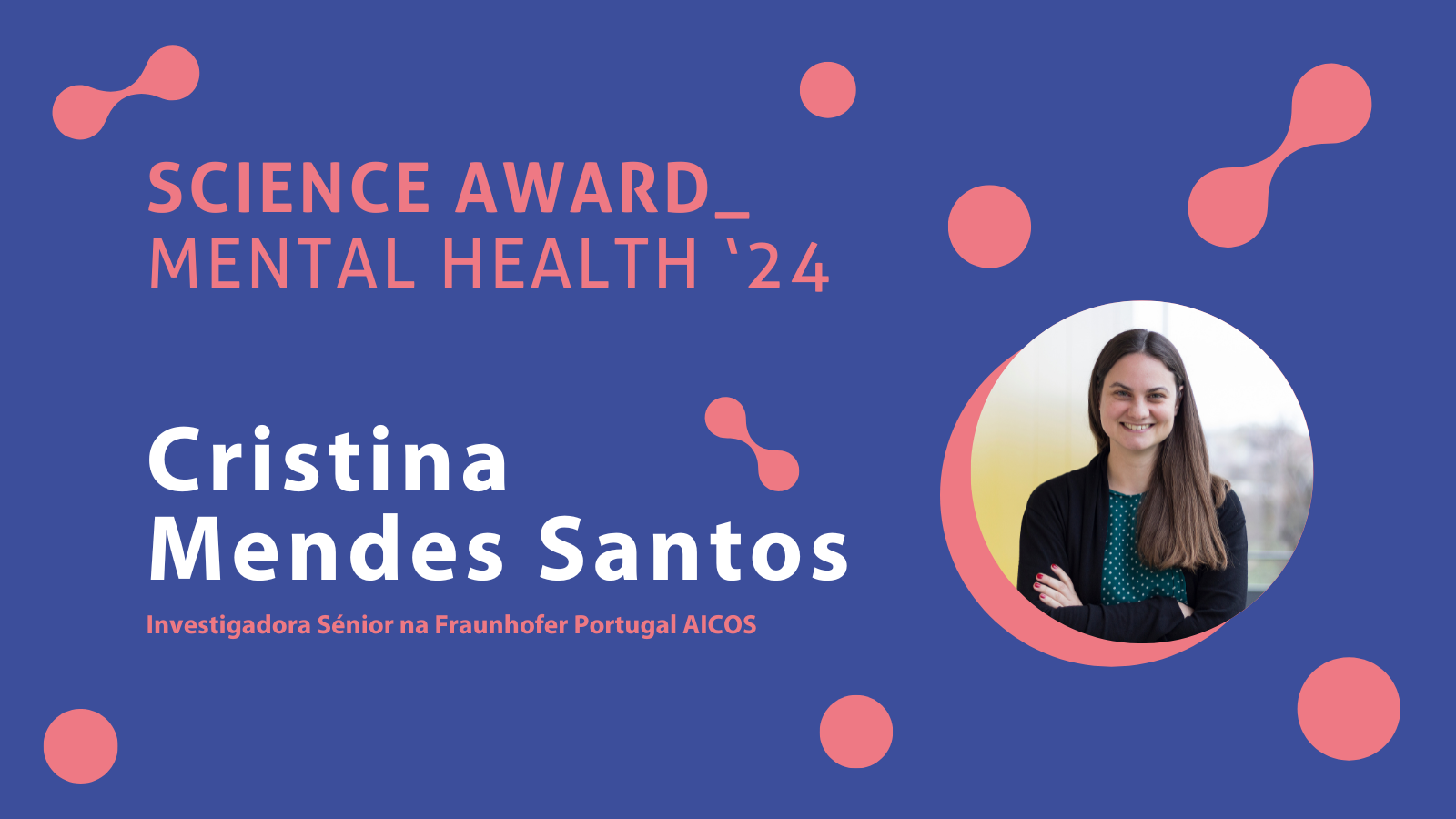Cristina Mendes Santos, Senior Researcher at Fraunhofer Portugal AICOS, is the winner of the FLAD Science Award on Mental Health 2024 and will receive 300 thousand euros to develop a project that seeks to significantly increase scientific knowledge and the development of clinical practice to support people at risk of transitioning to Psychosis, using innovative methods that involve data collection through sensors from mobile devices – such as smartphones and bracelets and Artificial Intelligence.
The FLAD Science Award Mental Health supports young researchers in Portugal to develop new lines of clinical research in Mental Health, from prevention to treatment and rehabilitation, in collaboration with research centers in the United States. Our goal is to contribute to the quality of life of people suffering from mental disorders.
The annual award has been awarded since 2021, with recognition from the World Health Organization and the United Nations High Commissioner for Human Rights. The winners receive 300 thousand euros over 3 years to develop their projects.
Cristina Mendes Santos is a Senior Researcher at the Assistive Information and Communication Solutions research center at Fraunhofer Portugal (AICOS), and wins the FLAD Science Award on Mental Health 2024 with the project ‘PRODROMUS – A digital phenotyping enhanced just-in-time adaptive intervention for preventing people at ultra-high risk, clinical high risk, or with first-episode psychosis from transitioning to psychosis’. The project will be developed in collaboration with Harvard Medical School.

The project is dedicated to the problem of Psychosis – a set of severe and disabling mental disorders that are characterized by a loss of contact with reality, delusions, changes in thinking, hallucinations, negative symptoms such as disinterest, detachment and affective dullness and bizarre behaviors, which result in high psychological suffering and negatively affect all spheres of the person’s life. It is estimated that psychosis affects 26.6 out of every 100,000 people per year, with significant socio-economic impacts, and a high consumption of health resources and services.
Despite the associated psychological distress and the effectiveness of early interventions targeting individuals at risk of transitioning to psychosis, specialised access and support are limited and often delayed, occurring on average one year after the onset of attenuated psychotic symptoms – in Portugal, about two years from the onset of the first psychotic symptoms to their treatment.
The award is a recognition of the need for non-stigmatising clinical interventions that are available in a timely manner and well tailored to an individual’s risk of transition to psychosis. The use of digital technologies and artificial intelligence will contribute to the accurate assessment of psychotic conditions to the prediction of the evolution of psychosis in people at high risk and, certainly, to the development of successful interventions in real-world contexts. – Elsa Henriques, member of FLAD’s Executive Board
Cristina Mendes Santos proposes to collect data in real-life contexts, moment by moment, through widely used commercial mobile devices – such as smartphones and sports bracelets – to capture a digital expression of human behavior. These data will be analysed using machine learning and artificial intelligence techniques to customise and trigger the real-time delivery of adaptive psychosocial interventions to at-risk individuals, exploring their effectiveness in preventing psychosis, and promoting global functioning, cognitive functioning and quality of life in people at risk of transitioning to psychosis.
This is an innovative solution, which will be co-developed with people at risk of transitioning to psychosis, their families and health professionals, in order to bring them to the center of the development process, and ensure that the intervention and technologies developed respond to their real needs, facilitating their implementation.
The project will also develop a clinical trial with 168 people at risk of transitioning to psychosis, to evaluate the efficacy, user experience, implementation and cost-effectiveness of the solution in clinical and real-life contexts, which will be conducted in Portugal by a multidisciplinary team that will include clinicians, engineers, designers and researchers from Fraunhofer Portugal AICOS, Beth-Israel Deaconess Medical Center – Harvard Medical School, Hospital Escola–Universidade Fernando Pessoa, Centro Hospitalar São João, Linköping University, Escola Superior de Saúde and NOVA School of Public Health.
About the jury
The evaluation of this award was made by a scientific committee composed of:
- Catarina Resende de Oliveira, Professor at the Faculty of Medicine of Universidade de Coimbra, former Director of the Center for Neurosciences and Cell Biology, President of the Agency for Clinical Research and Biomedical Innovation (AICIB).
- Daniel Sampaio, Psychiatrist, Emeritus Full Professor of Psychiatry and Mental Health, Faculty of Medicine, Universidade de Lisboa, Founder of the Portuguese Society of Family Therapy.
- Margaret Lanca, Assistant Professor in the Department of Psychiatry at Harvard Medical School, President of the Massachusetts Psychological Association, and Director of Adult Neuropsychology and Psychological Testing and Training at Cambridge Health Alliance.
Related Posts
25 de March, 2025
Note of Condolence – Charles Buchanan (1934-2025)
24 de March, 2025
Applications Open: FLAD/Saab Visiting Professor at UMass Lowell 2026
Portuguese professors can apply to…
17 de March, 2025
FCT and FLAD sign new protocols with the University of California
The objective is to promote academic…


